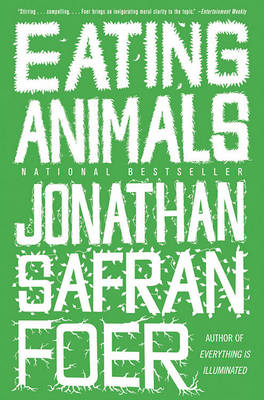Reviewed by brokentune on
http://brokentune.booklikes.com/post/790385/eating-animals
I'm not a big fan of Jonathan Safran Foer's fiction but - following a recommendation - I have had “Eating Animals” on my kindle for quite some time. It took a while to overcome the trepidation of trusting JSF to write about a topic that relates to a personal bias of mine. Straight out - I wholeheartedly agree with the overall message of the book that ask us to question the ethics of the food industry.
It is because of this bias of mine that reviewing this book was difficult.
There are also a number of reasons why reading this book is difficult. It certainly is a challenge for anyone who cannot stomach to read about animal cruelty. However, I will focus on why it has taken me a while to write a review:
1. As mentioned, I am biased – I know I am and am fully aware that this affects my reading of this book and my comments on it. It is difficult to critique something when the overall focus of the book aligns with your personal belief system; but
2. I absolutely detest it when people start preaching to others about how they should live their lives, what they should believe, or what they should eat; and
3. I have a problem with JSF's writing in this book. As much as I agreed with the overall message, I resented the way he used to get his point across. A large part of JSF's investigation into the food industry is presented in a way that cannot claim to have any other intention than to shock readers. Now, I'm fully aware that the facts presented by JSF - and he seems to have done a fair bit of research - are shocking. What I am irked about, though, is that these facts are dressed up in personal stories almost as if readers could not be trusted to infer their own conclusions.
Want an example? (Readers of a nervous disposition beware!)
"Pigs down on the kill floor have come up and nuzzled me like a puppy. Two minutes later I had to kill them— beat them to death with a pipe…. When I worked upstairs taking hogs’ guts out, I could cop an attitude that I was working on a production line, helping to feed people. But down in the stick pit I wasn’t feeding people. I was killing things."
Just how common do such savageries have to be for a decent person to be unable to overlook them? If you knew that one in one thousand food animals suffered actions like those described above, would you continue to eat animals?
So, while I agree with JSF's effort to raise awareness of cruelty against animals within the food industry, I found his writing style at times patronising and preachy.
Despite this, I hugely admire JSF for his effort to discuss the conditions in which animals are kept and the ethical dilemma that developed from the industrialisation of the food industry. Also, one of the interesting points about the book, is that JSF makes an effort to portray alternatives to industrialised rearing of animals, and he tries to make a case for ethical farming because, as he concludes,
“If nothing matters, there’s nothing to save.”
Reading updates
- Started reading
- 15 February, 2014: Finished reading
- 15 February, 2014: Reviewed
